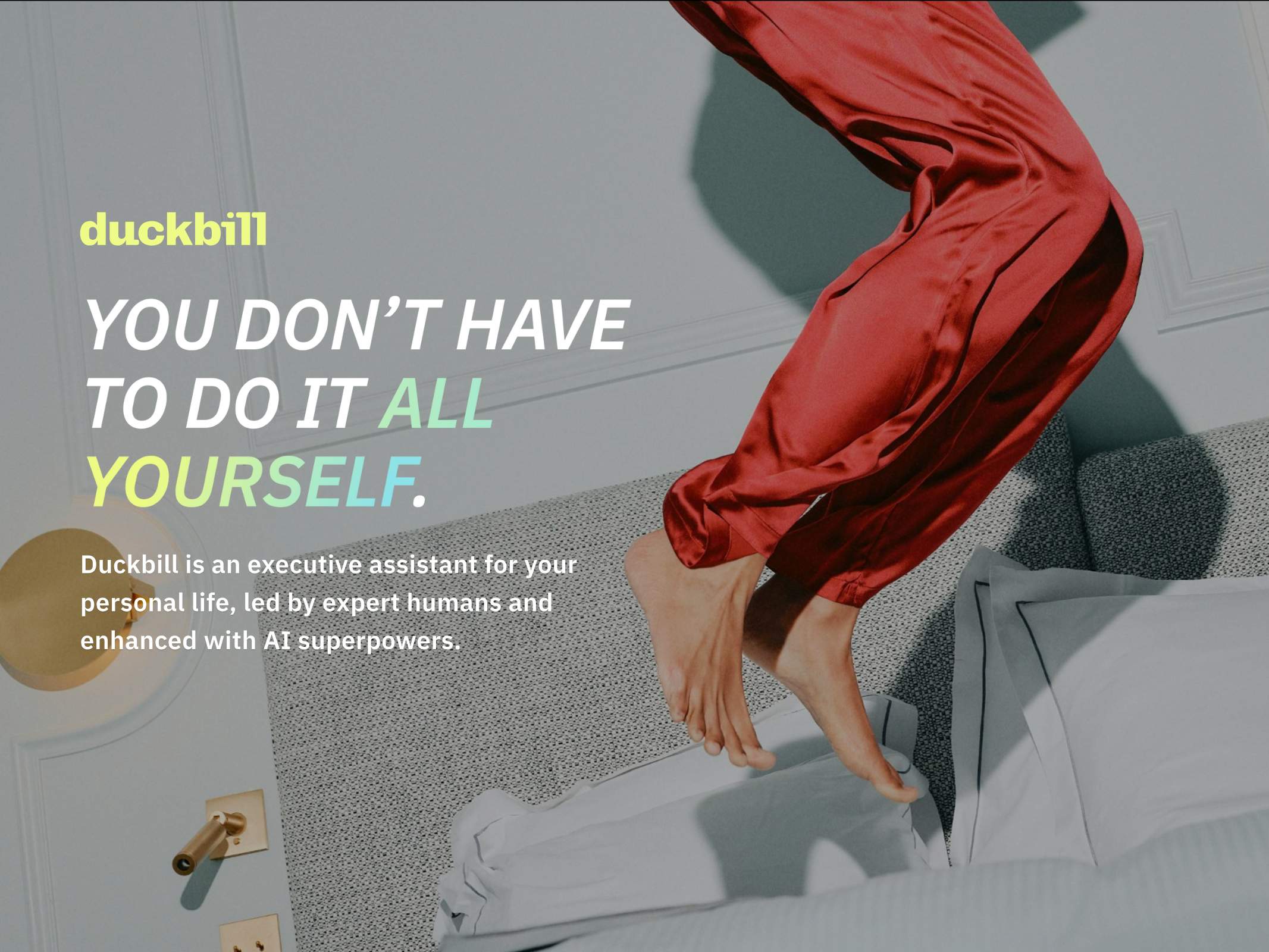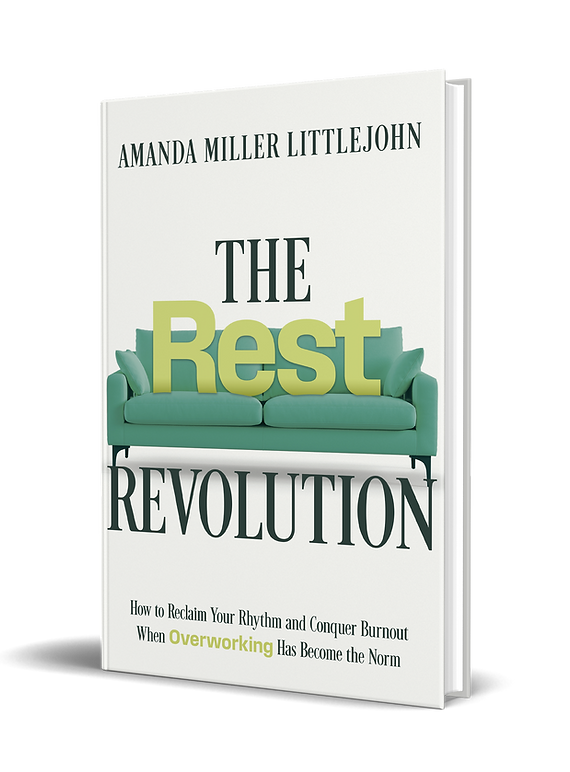In a conversation with Kitwing Editor-in-Chief Tasha Gideon, Amanda Miller Littlejohn shares her perspective on finding sustainable success in a culture obsessed with hustle and grind. Amanda is an executive coach, Mental Health Fellow at the Carter Center, and the author of The Rest Revolution.
You've said that "rest is not a reward." What does that mean, and how can people incorporate rest into their lives as a necessity rather than an afterthought?
Amanda: It starts with a fundamental mindset shift: understanding yourself as a being in nature. When you can genuinely see yourself as a natural being, you recognize that every living thing has innate rhythms and seasons where rest isn't optional but required.
Think about it: we don't question why plants need dormant periods or why animals hibernate. Yet somehow, we've convinced ourselves that humans can operate continuously without restoration. Your body needs time to repair, your brain needs to process information, your organs need to regenerate.
I had a client who once told me, "I've been treating my body like it's just the thing that carries my brain around." That perfectly captures how disconnected we've become. We think we can just decide we only need minimal sleep or that we can push ourselves indefinitely without consequences. That's simply not how our biology works.
Just as I wouldn't be surprised when my office plants wilt if I decide not to water them, we shouldn't be surprised when our bodies and minds begin to break down when we deprive them of rest. The issue is we don't think about ourselves with the same care and logic.
Why do founders and high achievers particularly struggle with slowing down, and how does this connect to identity?
Amanda: What I've been exploring lately isn't just about volume of work but how we define ourselves through work entirely. If I stripped away all my titles (executive coach, award-winning strategist, mental health fellow at the Carter Center, author), I'm still a person. But who am I beyond all those achievements and accolades?
Your personal get-sh*t-done squad. Duckbill combines expert human assistants with AI capabilities to tackle your life’s inbox. Delegate, breathe, repeat. Duckbill’s already got it’s-a-no-brainer pricing, but Kitwing members can get 50% off for two months with code KITWING.
Most of us struggle with this question because our society has conditioned us to define ourselves through our productivity. The founder culture you mentioned is just a branch of that larger problem: defining yourself through the overwork of building something, scaling it, making it profitable.
The roots of this whole tree are rotten. From childhood, we ask kids, "What do you want to be when you grow up?" meaning what profession. We establish benchmarks for academic and professional achievement as if that's the complete roadmap for a successful life.
We have a vision for work until you're deemed "too old to be useful," and then what? But imagine if we had been developing all the different facets of ourselves all along: who we are in our communities, as friends, as parents, and most importantly, to ourselves. Aging would then become a joy because your identity wouldn't collapse when you stepped away from work.
I don't have all the answers, but I know when people come to me for coaching feeling unfulfilled despite their success, we often discover they're missing pieces beyond work, whether that's inner joy, meaningful impact, or relationships that aren't tied to productivity.
You've talked about "rightsizing your ambition." How can someone distinguish between a healthy stretch goal and an unhealthy one?
Amanda: It comes down to being in honest conversation with yourself about the why behind your goals. I've seen this pattern repeatedly in my coaching practice: people come to me on career paths they don't even remember consciously choosing. When I ask them to tell me their story, they'll often reveal, "Someone told me I should do this, so I did it." And I think, "That's how you decided to invest twenty years of your life?"
My goal is to help people return to a time before external expectations shaped their ambition and ask: Was this something I genuinely wanted? And even if it was something I wanted then, is it still aligned with who I am now?
For founders setting goals, ask yourself: What made me set this particular target? Is it arbitrary? Am I doing this to impress others or to compete with peers? Or is there a deeper purpose that resonates with my values?
For example, with my book, I don't have a specific sales number in mind, but I know I want it to reach a tipping point where people are discussing it. Not because I want fame, but because I believe this message about restoring what's been depleted in us was entrusted to me to share. The goal isn't about vanity metrics but about impact.
You've introduced the concept of "personal brand equity." How can people leverage what they've already built instead of constantly creating from scratch?
Amanda: I've been thinking a lot about the equity we build over time, when you've invested years becoming skilled at something, building connections, and developing expertise. There's tremendous value in that accumulated experience that we often fail to recognize.
Recently, I taught a workshop on clarity where I simply compiled the best exercises I've created and encountered in fifteen years of coaching. There's inherent credibility when you can say, "These are the tools that move the needle most consistently across hundreds of clients and industries."
Similarly, when I committed to writing more Forbes articles, I initially worried about generating enough content. Then I realized I had years of talks, podcast interviews, and presentations I could tap into.
We're constantly accumulating this equity, these appreciating assets, and then ignoring them because we've been conditioned to believe that only new, difficult work has value. But that's simply not true.
And here's where this connects to rest: you have to pause and be still to even become aware of what you've already built. That epiphany often comes during moments of restoration, not during frantic activity.
During our conversation, you mentioned my own newsletter as an example of leveraging brand equity. Could you share that story for our readers?
Amanda: Yes. Tasha, you shared a powerful example of this principle in action! You told me how you were tired of reinventing the wheel with complex client services and began asking, "What is the easiest thing I could do that leverages everything I've already done?"
The answer was the Kitwing newsletter. When you started going through your files, you discovered you had an abundance of content, enough to create multiple newsletters just by repurposing what you already had.
What struck me was how you described the shift that happened when you abandoned the belief that "it has to be hard to be good." You shared that money actually started finding you.
Beyond the financial aspect, your community rallied around you with offers to help, create logos, and support your vision. As you put it, "The difference in momentum and flow has been a total sea change."
But the most important insight was that this only happened when you slowed down enough to receive the message: "Make time for contemplation." It perfectly illustrates how rest and stepping back can actually accelerate progress rather than impede it.
Does rest connect to productivity in ways that might surprise people?
Amanda: There's this counterintuitive truth that slowing down can actually accelerate your progress. When you're constantly executing without reflection, you miss opportunities that are right in front of you.
The hustle mentality teaches us that effort in equals output: the more hours you work, the better the results. But that's a fundamentally flawed equation. Sometimes the most productive thing you can do is take a nap, meditate, or walk through the forest.
These moments of stillness allow your unconscious mind to make connections and generate insights that wouldn't emerge during active work. They also give you the clarity to see which efforts are actually worthwhile versus which ones are just motion without progress.
I've found that my most valuable ideas and realizations don't come during my busiest periods but during moments of restoration. That's when I can step back and see the forest rather than just the trees directly in front of me.
What would you say to someone who feels they can't afford to rest in today's competitive environment?
Amanda: I'd say you can't afford not to rest. We've created this false binary where we think it's either productivity or rest, but they're actually two sides of the same coin. Sustainable high performance requires restoration.
Look at elite athletes; they don't train at maximum intensity every day. They understand that recovery is when the actual strength-building happens. The same applies to cognitive and creative work.
When you consistently deprive yourself of rest, you're not just compromising your health but also your effectiveness. You make poorer decisions, miss creative connections, and ultimately produce lower-quality work, all while feeling more stressed and less fulfilled.
Instead of asking "How can I afford to rest?" ask "How can I structure my work to include necessary restoration?" This might mean working in focused sprints followed by genuine breaks, taking real weekends, or even embracing seasons of higher and lower intensity throughout your year.
Remember that rest isn't just the absence of work; it's an active process of restoration that makes your work possible in the first place.
Amanda Miller Littlejohn is an executive coach, author, and mental health advocate whose work focuses on helping high-achievers reconnect with their deeper purpose and create sustainable success.
She is a sought after executive coach and brand strategist whose clients span the globe from San Francisco to Singapore. Amanda is a 2024-2025 Rosalynn Carter Mental Health Journalism Fellow. Her writing has appeared in The Washington Post, Los Angeles Times, and Forbes.
~🪽~
Image courtesy Amanda Miller Littlejohn



